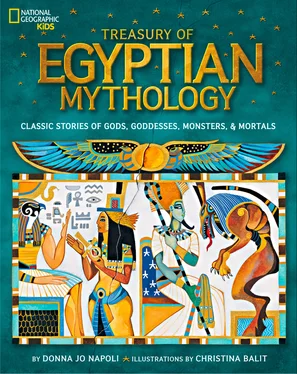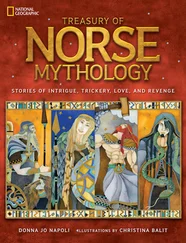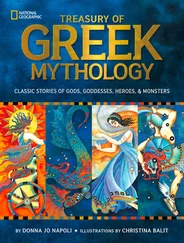Christina Balit - Treasury of Egyptian Mythology - Classic Stories of Gods, Goddesses, Monsters & Mortals
Здесь есть возможность читать онлайн «Christina Balit - Treasury of Egyptian Mythology - Classic Stories of Gods, Goddesses, Monsters & Mortals» — ознакомительный отрывок электронной книги совершенно бесплатно, а после прочтения отрывка купить полную версию. В некоторых случаях можно слушать аудио, скачать через торрент в формате fb2 и присутствует краткое содержание. Жанр: unrecognised, на английском языке. Описание произведения, (предисловие) а так же отзывы посетителей доступны на портале библиотеки ЛибКат.
- Название:Treasury of Egyptian Mythology: Classic Stories of Gods, Goddesses, Monsters & Mortals
- Автор:
- Жанр:
- Год:неизвестен
- ISBN:нет данных
- Рейтинг книги:3 / 5. Голосов: 1
-
Избранное:Добавить в избранное
- Отзывы:
-
Ваша оценка:
- 60
- 1
- 2
- 3
- 4
- 5
Treasury of Egyptian Mythology: Classic Stories of Gods, Goddesses, Monsters & Mortals: краткое содержание, описание и аннотация
Предлагаем к чтению аннотацию, описание, краткое содержание или предисловие (зависит от того, что написал сам автор книги «Treasury of Egyptian Mythology: Classic Stories of Gods, Goddesses, Monsters & Mortals»). Если вы не нашли необходимую информацию о книге — напишите в комментариях, мы постараемся отыскать её.
Treasury of Egyptian Mythology: Classic Stories of Gods, Goddesses, Monsters & Mortals — читать онлайн ознакомительный отрывок
Ниже представлен текст книги, разбитый по страницам. Система сохранения места последней прочитанной страницы, позволяет с удобством читать онлайн бесплатно книгу «Treasury of Egyptian Mythology: Classic Stories of Gods, Goddesses, Monsters & Mortals», без необходимости каждый раз заново искать на чём Вы остановились. Поставьте закладку, и сможете в любой момент перейти на страницу, на которой закончили чтение.
Интервал:
Закладка:
All that love heaped on his brother galled Set. Alas, he couldn’t think of anything else, he couldn’t enjoy ordinary things, he couldn’t love anyone.
And he looked at
Usir. He looked until his eyes burned as dry as the desert he prowled.Then the strands of
envy twisted even tighter around Set’s innards, for his brother Usir fawned over Set’s son Inpu. Set’s teeth went grimy with disgust. And Inpu, the ingrate, he responded to this attention, caring for his uncle Usir too much—he even seemed to take after him. Intolerable—it was Set the boy should love like that! So Set was glad when the boy left home to go work in the underworld Duat. Who needed such a son around?But still Set had to watch
Aset’s face as she gazed at Usir. And now he looked around and noticed how humans adored this sister and this brother that they had chosen as their queen and king, and his top lip curled. There were so many humans by now—they just kept multiplying. And that meant Set’s brother Usir was king of far too much, and was loved by far too many.Sometimes a brother doesn’t need a reason to be spiteful toward another brother. Set was almost sure he would have hated Usir no matter what, regardless of how Aset loved him, regardless of how his own son
Inpu admired him. But the way all those people loved Usir—well, that went beyond the pale. King of Egypt! Bah! Set’s insides swirled like the very strongest of tempests, with lightning and thunder and shrieking winds—and in this stormy state he vowed to himself to crush Usir.Set held a banquet. He arranged cones of scented fat in a large circle and set them ablaze to keep away pesky mosquitoes. He gave the goddesses lotus flower necklaces—knowing, of course, that this would endear him to Aset. He filled a basin with sparkling clean water for everyone to wash their hands in. Then he served them bread and great quantities of beer. As they were lolling around, satiated, he pulled a cloth away to reveal a beautiful box.
Usir ran his hand appreciatively along the intricate carvings. “Where did you get this, brother?”

Usir slid happily into the majestic cedar box. It felt like the most comfortable of beds. How cold must
Set’s heart have been, planning the doom ahead.The combination of gold gilt, the color so dear to the great god Ra, and deep blue paint, the color so dear to his beloved wife Aset, made the box nearly irresistible to the unsuspecting Usir.
“It’s superb, isn’t it?” Set leaned in toward Usir with a brotherly intimacy. “Tell you what. Whoever fits perfectly in this box, well, that’s the rightful owner of it. I will regale that person with this fine box.”
Each guest took a turn at lying in the box. But each was too short or too long or too fat or too thin. In contrast, Usir fit perfectly. Naturally. For Set had taken all the relevant measures of his brother as he slept, and had the box built just so.
The instant Usir lay inside, Set and his helpers rushed forward, closed the lid, and sealed it. Set lifted the box over his head and flung it with all his might into the raging Nile River. And for the first time in so long he couldn’t remember, Set felt triumph. He was rid of Usir, rid of the scourge of his life. At last, he could be all he wanted to be; he stood in no one’s shadow.
Such is the brutality unchecked envy can wreak.
But good has its own way of responding—and both Aset and Usir were deeply good. This story was far from its end.
Aset: Aset loved lotuses, the symbol of Upper Egypt. Usir loved papyrus reeds, the symbol of Lower Egypt, especially where the Nile flows into the sea. Together they made the perfect ruling couple for all Egypt.

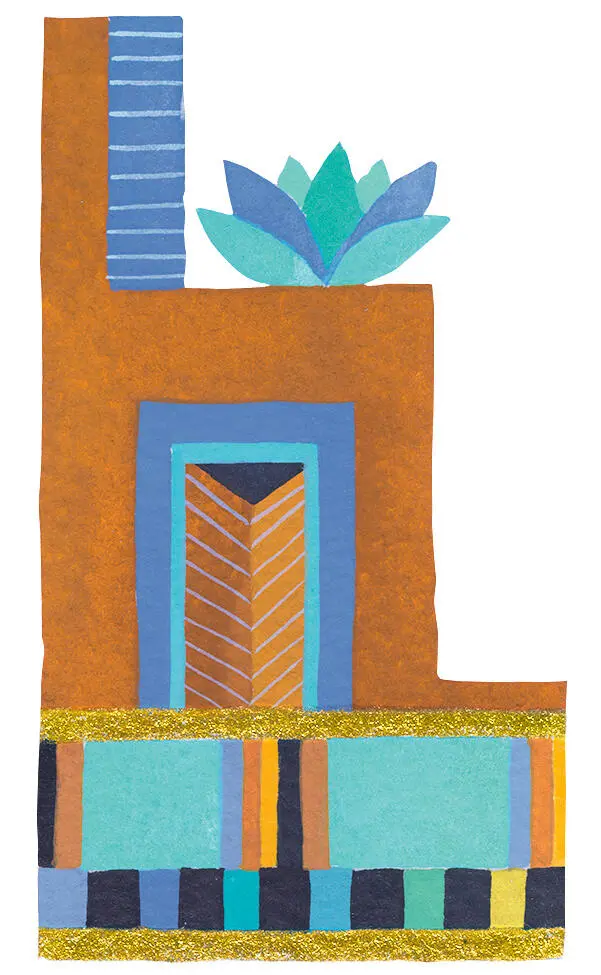
ASET (ISIS)
Devoted Wife and Mother
The god
Set was so envious of his brother Usir that he committed a dastardly act. He nailed Usir into a box and threw it into the Nile River.“Ahiii,” screamed Aset. She ran along the shore, arms outstretched futilely. She must catch up, she must pull the box to safety. She imagined her husband trapped inside, panicked. She ran.
But the current raced north, carrying her husband inexorably toward the sea. And the wind blew south, impeding
Aset’s every step. She ran hard, seeing the white-foamed swirl of the swift and wild river. She ran harder, hearing nothing but the shriek of the wind rasping her ears raw. The box was already out of sight! Aset had to run yet faster. That was her husband—the love of her life!Aset ran all that day, all that night, all the next day. Her feet bled. Her legs ached. When she arrived at the seashore, she raced back and forth, calling out over the green and blue and purple waters, calling, calling. She rent her hair. She grabbed a clamshell and shaved off her eyebrows. She beat her chest.
The world spun around this goddess, this woman in love, bereft and alone, who had no choice but to prostrate herself on the beach and wait for the dizziness to pass and hope against hope that her husband had managed to get out of the box before he suffocated.
Our
Alphabet’s HistoryThe
Kenaani’s land became known as Phoenicia. It spread between the River Jordan and the Mediterranean Sea. The people were known for sea trading and purple dye made from murex snails. But we know them most for their abjad, a writing system with letters that represented consonant sounds. The Greeks borrowed this abjad and added letters for vowels. The Etruscans then borrowed it, then the Romans, each making changes—hence our alphabet.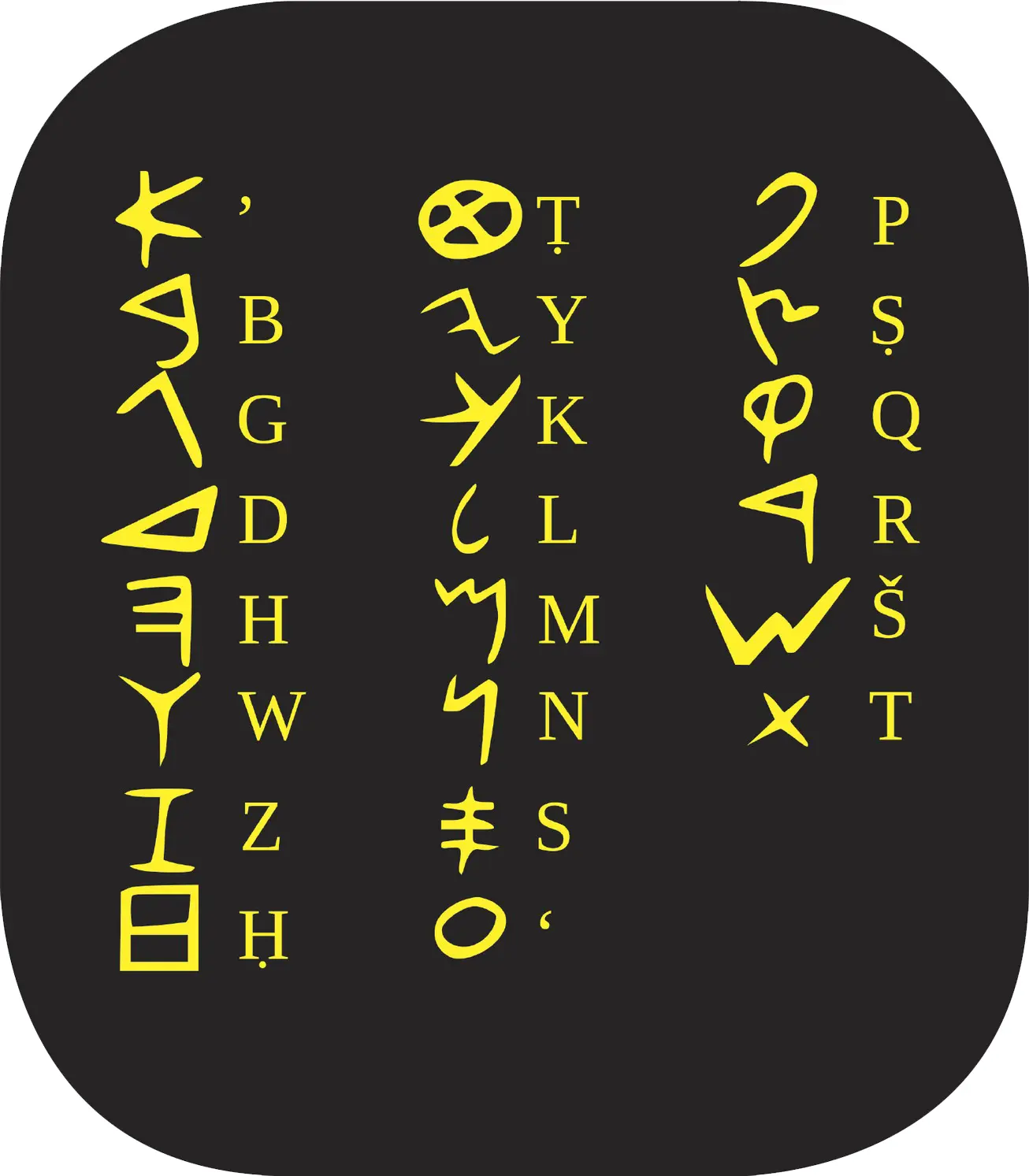
A tablet showing the Phoenician alphabet
Meanwhile the
box that held Usir had washed out to the middle of the vast Mediterranean Sea and floated in that wadj wer—that great green—aimlessly, a rudderless, sail-less skiff, until the currents eventually carried it toward shore again. But not back to the mouth of the Nile where miserable Aset lay crying, no. The box settled far to the east, near the city of Kubna in the land of the Kenaani.The coast there was thick with strong reeds that reached out. Like tentacles, they slipped around and over and under each other and pulled the box in, wrapping themselves about it over and over, caressingly. Somehow one reed pushed against another so insistently that the two reeds merged, and then another merged with them, and soon the mass of reeds was a single shrub engulfing the box. And then the shrub grew.
This sort of magic doesn’t happen every day—and magic it surely was. For inside that box lay the corpse of the god Usir, who had known how to bring fertility to the earth, who could make anything grow. So perhaps that very power had transferred from the god to the box as he gave his last breath. Who can know such a thing? Yet that shrub grew faster than any shrub had ever grown before, and became a massive
cedar tree, 130 feet tall, studded with cones. Hoopoe birds came in droves to give themselves sand baths under the tree and to nest among its silver-green needle-like leaves.The mighty cedar could be seen from afar, but it could be smelled even before it was seen, for it gave off a spicy, alluring aroma. Soon the king himself noticed the tree, and he called his queen to his side to inhale its essence. She swooned at the cedar perfume. After all, she was late in her pregnancy and she was given to swooning.
Читать дальшеИнтервал:
Закладка:
Похожие книги на «Treasury of Egyptian Mythology: Classic Stories of Gods, Goddesses, Monsters & Mortals»
Представляем Вашему вниманию похожие книги на «Treasury of Egyptian Mythology: Classic Stories of Gods, Goddesses, Monsters & Mortals» списком для выбора. Мы отобрали схожую по названию и смыслу литературу в надежде предоставить читателям больше вариантов отыскать новые, интересные, ещё непрочитанные произведения.
Обсуждение, отзывы о книге «Treasury of Egyptian Mythology: Classic Stories of Gods, Goddesses, Monsters & Mortals» и просто собственные мнения читателей. Оставьте ваши комментарии, напишите, что Вы думаете о произведении, его смысле или главных героях. Укажите что конкретно понравилось, а что нет, и почему Вы так считаете.
